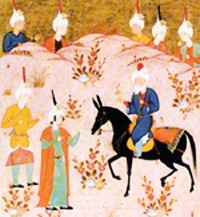Panentheism
Panentheism (from Greek pan meaning "all", en meaning "in", and theos meaning "God"; literally "all-in-God") is a theological philosophy that posits that God is greater than the universe and includes and interpenetrates it. This belief system contrasts with pantheism, which holds that God is synonymous with the universe. In panentheism, God is seen as the eternal animating force behind the universe, but also as having a transcendent aspect that is beyond the physical universe.
Overview[edit | edit source]
Panentheism suggests that God is both immanent within the universe, giving it life and being, and transcendent, existing beyond the universe. This concept allows for a God that is both personal, interacting with creation, and transcendent, beyond all things. It is a middle ground between theism, which sees God as entirely separate from and independent of the universe, and pantheism, which equates God with the universe.
Historical Development[edit | edit source]
The concept of panentheism has roots in various religious and philosophical traditions around the world. In Western philosophy, elements of panentheism can be seen in the works of pre-Socratic philosophers, Plato, and Plotinus. In the modern era, panentheism was further developed by philosophers such as Friedrich Wilhelm Joseph Schelling and Alfred North Whitehead, whose process theology has been influential in contemporary panentheistic thought.
In Hinduism, the Bhagavad Gita and certain Upanishads offer interpretations that have been seen as panentheistic. The idea that Brahman (the ultimate reality) is both immanent in the world and transcends it reflects panentheistic thought.
Theological Implications[edit | edit source]
Panentheism has significant implications for theology and spiritual practice. It suggests a God who is actively involved in the world and whose presence can be experienced in everyday life. This view encourages a relationship with the divine that is intimate and personal, while also acknowledging the mystery and transcendence of God.
Criticism and Support[edit | edit source]
Critics of panentheism often argue that it is a vague or contradictory concept, struggling to adequately distinguish itself from pantheism or traditional theism. Supporters, however, argue that panentheism provides a more nuanced understanding of the divine, accommodating both the immanence and transcendence of God in a way that reflects the complexity of the universe and human experience.
Influence[edit | edit source]
Panentheism has influenced various fields beyond theology, including environmental ethics, where it supports the view that the natural world is a manifestation of the divine and should be treated with reverence and care. It also has implications for psychology and spirituality, suggesting that the divine can be experienced directly in the natural world and in human consciousness.
See Also[edit | edit source]
Navigation: Wellness - Encyclopedia - Health topics - Disease Index - Drugs - World Directory - Gray's Anatomy - Keto diet - Recipes
Search WikiMD
Ad.Tired of being Overweight? Try W8MD's physician weight loss program.
Semaglutide (Ozempic / Wegovy and Tirzepatide (Mounjaro) available.
Advertise on WikiMD
WikiMD is not a substitute for professional medical advice. See full disclaimer.
Credits:Most images are courtesy of Wikimedia commons, and templates Wikipedia, licensed under CC BY SA or similar.
Contributors: Prab R. Tumpati, MD




